
A department store is a retail establishment offering a wide range of consumer goods in different areas of the store, each area ("department") specializing in a product category. In modern major cities, the department store made a dramatic appearance in the middle of the 19th century, and permanently reshaped shopping habits, and the definition of service and luxury. Similar developments were under way in London, in Paris and in New York City (Stewart's).
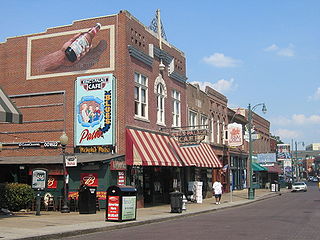
Beale Street is a street in Downtown Memphis, Tennessee, which runs from the Mississippi River to East Street, a distance of approximately 1.8 miles (2.9 km). It is a significant location in the city's history, as well as in the history of blues music. Today, the blues clubs and restaurants that line Beale Street are major tourist attractions in Memphis. Festivals and outdoor concerts frequently bring large crowds to the street and its surrounding areas.

A general merchant store is a rural or small-town store that carries a general line of merchandise. It carries a broad selection of merchandise, sometimes in a small space, where people from the town and surrounding rural areas come to purchase all their general goods. The store carries routine stock and obtains special orders from warehouses. It differs from a convenience store or corner shop in that it will be the main shop for the community rather than a convenient supplement.
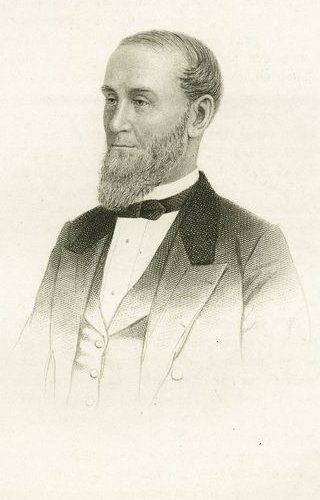
Alexander Turney Stewart was an American entrepreneur who moved to New York and made his multimillion-dollar fortune in the most extensive and lucrative dry goods store in the world.
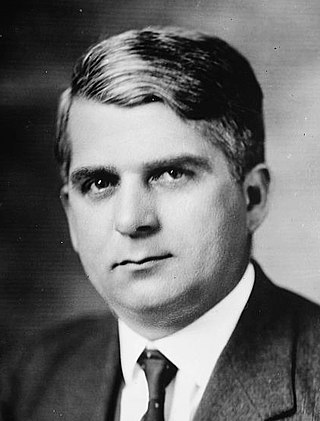
Clarence Saunders was an American grocer who first developed the modern retail sales model of self service. His ideas have had a massive influence on the development of the modern supermarket. Saunders worked for most of his life trying to develop a truly automated store, developing Piggly Wiggly, Keedoozle, and Foodelectric store concepts.

Rich's was a department store retail chain, headquartered in Atlanta, Georgia, which operated in the southern U.S. from May 28, 1867 until March 6, 2005 when the nameplate was eliminated and replaced by Macy's. Many of the former Rich's stores today form the core of Macy's Central, an Atlanta-based division of Macy's, Inc., which formerly operated as Federated Department Stores, Inc.

Fenwick is a British chain of department stores in the United Kingdom. It was founded in 1882 by John James Fenwick in Newcastle upon Tyne, and currently has nine branches. It was a member of the International Association of Department Stores from 1988 to 2010.
Goldsmith's was a department store founded in Memphis, Tennessee, in 1870 by German immigrant brothers Jacob and Isaac Goldsmith. It grew into a chain largely located in the Memphis metropolitan area, until 2005, when the nameplate was eliminated and replaced by Macy's. Goldsmith's stores were subsequently folded into Federated's Macy's Central division, reorganized into Macy's South, and today into a differently configured Macy's Central, the current division encompassing the stores.
Hutzler's, or Hutzler Brothers Company, was a department store founded in Baltimore by Abraham G. Hutzler (1836–1927) in 1858. From its beginning as a small dry goods store at the corner of Howard and Clay Streets in downtown Baltimore, Hutzler's eventually grew into a chain of 10 department stores, all of which were located in Maryland.
Mandarake Inc. is a Japanese retail corporation that operates a chain of used good stores. Founded as a used bookstore specializing in manga in 1980, Mandarake incorporated in 1987 and currently operates 11 retail locations and one fulfillment center. The company focuses on the purchase and sale of a wide range of collectables and otaku-related goods, including anime- and manga-related items, DVDs, CDs, toys, figurines, trading cards, video games, cosplay items, animation cels, and dōjinshi.
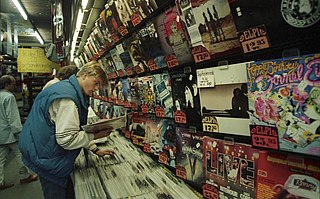
A record shop or record store is a retail outlet that sells recorded music. Per the name, in the late 19th century and the early 20th century, record shops only sold gramophone records. But over the course of the 20th century, record shops sold the new formats that were developed, such as eight track tapes, compact cassettes and compact discs (CDs). Today, in the 21st century, record stores mainly sell CDs, vinyl records and, in some cases, DVDs of movies, TV shows, cartoons and concerts. Some record stores also sell music-related items such as posters of bands or singers, related clothing items and even merchandise such as bags and coffee mugs.
Sibley, Lindsay & Curr Company, known informally as Sibley's, was a Rochester, New York–based department store chain with stores located exclusively in the state of New York. Its flagship store, at 228 East Main Street in downtown Rochester, also housed its headquarters and featured an elegant executive dining room on the top floor.

The H. & S. Pogue Company, also known as Pogue's, was a Cincinnati, Ohio–based department store chain founded by two brothers, Henry and Samuel Pogue. Founded in 1863, it became one of the most prominent department store chains in the region, until it was sold in 1961 to Associated Dry Goods.

The Stax Museum of American Soul Music is a museum located in Memphis, Tennessee, at 926 East McLemore Avenue, the original location of Stax Records. Stax launched and supported the careers of artists such as Otis Redding, Isaac Hayes, the Staple Singers, Sam & Dave, Booker T. & the M.G.'s, Rufus Thomas, Carla Thomas, Wilson Pickett, Albert King, William Bell, Eddie Floyd, Jean Knight, Mable John, and countless others including spoken word and comedy by Rev. Jesse Jackson, Moms Mabley, and Richard Pryor.
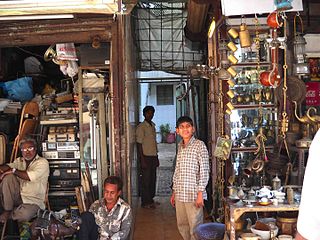
Chor Bazaar is one of the largest flea markets in India, located at Mutton street, near Bhendi Bazaar in Grant Road, South Mumbai. The area is one of the tourist attractions of Mumbai. The word "chor" means 'thief' in Marathi, Gujarati and Hindi. According to popular legend, if you lose anything in Mumbai you can buy it back from the Chor Bazaar.

Michael Jordan's Restaurant was a multi-level restaurant and sports bar located at 500 N. LaSalle Street in Chicago, Illinois, United States of America. Named after Michael Jordan, a basketball player with the Chicago Bulls, the restaurant was once one of the most popular tourist spots in Chicago. It operated from 1993 until 1999, closing shortly after Jordan's second retirement from playing basketball.

Tourism in Memphis includes the points of interest in Memphis, Tennessee such as museums, fine art galleries, and parks, as well as Graceland the Beale Street entertainment district, and sporting events.
Stroud's Mercantile or Stroud's Department Store was a department store located in Rogers, Arkansas. At the time of its closing in 1993, Stroud's was the oldest continuously operated privately owned retail business in the state. Its 1899 storefront at 114-116 West Walnut is a contributing property to the Rogers Commercial Historic District on the National Register of Historic Places. Two homes owned by Stroud family members; the Stroud House originally in Rogers, but later moved to Pea Ridge, Arkansas, and the Stroud House in Bentonville, Arkansas are individually listed.

The Union Block, also known as Kinyon's Block, Roe's Block, or Pear's Block, is a commercial building located at 114 East Front Street in Buchanan, Michigan. It was listed on the National Register of Historic Places in 2007.
Marston's was a department store based in San Diego, California, and founded by city leader George Marston. It had a downtown main store on Sixth Street and opened two suburban branches before being sold to The Broadway in 1961.























